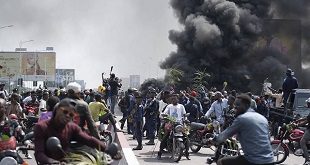
Kampala, Uganda | THE INDEPENDENT | Experts in the petroleum sector have revealed that the current inconsistencies in pump fuel prices are a preserve of individual dealers depending on their in-house issues.
Currently, a few dealers like Shell and Total Energies, are still pricing their diesel higher than petrol, a trend that started early last year, and at some individual stations, the gap has even widened. Whereas other dealers who have lesser stations have gone back to the norm, where petrol is priced higher than diesel.
From the dealers who are pricing diesel higher than petrol, the average prices stand at 5,320 shillings, and petrol at 5,030 shillings respectively. For the other category of dealers, on average, diesel costs 4,900 shillings and petrol 4,980 shillings.
As the fuel prices have largely been falling from a record high of 10,000 Shillings, which was a result of the Ukraine-Russia war, this current pump price inconsistency has brought concern among Ugandans, especially those using Masaka road highway.
Honey Malinga, the commissioner for petroleum in the Ministry of Energy and Mineral Development told URN that for several reasons, the world over there is a scarcity of diesel fuel andits demand is still high.
“You know Russia is among the highest processors of diesel in the world, and because of the war sanctions, now many European countries are buying diesel from where the rest of the world buys like in the Middle East and India, which increases demand, and creates scarcity globally,” Malinga says.
According to Malinga, the dealers that have their diesel prices higher than that of petrol, incur higher business operational costs than their counterparts.
“These big companies have higher overhead costs for their infrastructure, workers, and also the transportation,” he says. “As the other dealers use their own transport, the ones with higher prices, hire transport companies to whom they give their company logo to transport their product.”
Brand maintenance and competition among dealers, Malinga says, also contributes to this confusing pump price outlook, which is unusual in the Ugandan market.
He says: “Whereas some dealers might not invest much in ensuring the quality of their products, others especially those selling at a higher price, invest a lot because of the brand name they want to jealously protect. In addition, the players who sell at a lesser price use this as a chance to capture part of the market.”
From the dealer’s perspective, Anthony Ogalo, the general manager of the Association of Petroleum Marketing Professionals of Uganda, says that Uganda is not exceptional from the world trends which have seen the diesel – petrol price gap widening because of international geopolitical reasons. He adds that Uganda is not excluded from the effects of these factors.
According to Ogalo, though there have been record-high fuel prices the world over, the world is now experiencing a downward movement, and it is expected to continue as world economies continue to heal from the Covid pandemic effects.
Though Ogalo was not in position to explain the reasons behind the pricing inconsistency among the different dealers, he says that “each dealer has their own cost bases, and there are many factors that influence pricing, like storage, transportation, cost of one’s supply chain, and these are unique dependent on every dealer.”
He adds that the other determinant issue is the length of the dealer’s stock duration, saying that there are some dealers with short stocks like for two weeks and it is done, whereas there are those who have longer stocks like for three months. And each of these will price differently.”
Since Uganda is an open market economy, these price differences are expected, but to civil society, the government should not completely abandon the fuel sector because it is crucial to the country.
Dickens Kamugisha, the executive director for the African Insitute for Energy Governance, says that until the Ugandan government gets its own fuel reserves, the country will continue going through fuel prices ups and downs every time and again.
“It is still the same problem we are facing as a country, where the government doesn’t have its own national fuel reserves. This means that the bigger dealer will decide what to do and can price in a way of making more money. If we had the national reserves, the government would come and fix the prices using its own reserves, and the bigger dealers would not have succeeded in short changing their customers,” Kamugisha explains.
*****
URN
 The Independent Uganda: You get the Truth we Pay the Price
The Independent Uganda: You get the Truth we Pay the Price


